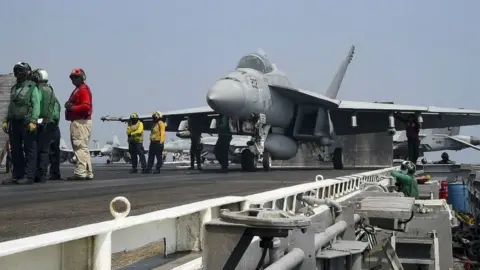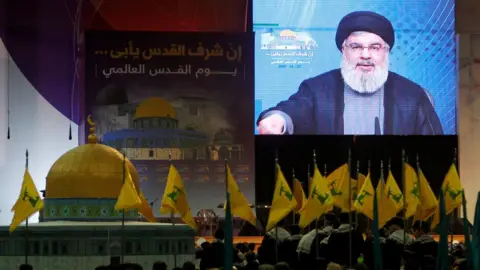Trump Jerusalem shift puts counter-terror efforts at risk
 Getty Images
Getty ImagesThe recognition by US President Donald Trump of Jerusalem as Israel's capital has triggered more than just criticism from America's allies.
Here in Bahrain, at the annual Manama Dialogue security conference, there is an almost universal concern that the announcement will be a gift to the region's twin adversaries - Iran and the jihadists of al-Qaeda and so-called Islamic State (IS).
"The president has lit a fire and left his Arab allies to deal with the blaze," said Elisabeth Marteu, Consultant Senior Fellow at the International Institute for Strategic Studies (IISS).
A former UK Special Forces officer, who asked not to be quoted, compared the announcement to "throwing a hand grenade into a room with the pin removed".
Officially, the Arab Gulf rulers have always supported the Palestinian right to a homeland, recognising it as a long-running source of grievance for the whole region and a popular pan-Arab, pan-Islamic cause.
Privately though, older members of the ruling families have never fully forgiven the Palestinian Authority for siding with Saddam Hussein's invasion of Kuwait in 1990.
Soon after that country's liberation I saw a piece of graffiti daubed on a wall in Kuwait City that read: "Jerusalem is the eternal home of the Jews and I am a Kuwaiti writing this."
That was in 1991 and things are different now. Most of the Arab world's populations are too young to remember, or even care about, the invasion of 1990, but they do care about Jerusalem.
It is the third holiest site in Islam, after Mecca and Medina, and it holds a special place in many people's hearts. What does this mean for counter-terrorism? It means a risk on two counts.
The first is the risk that people who might not be well disposed towards the West but were not planning to translate this into violent action may now think again.
Hediya Fathalla, an expert on Gulf security and a former Bahrain government official, told the BBC: "There are dormant jihadist mentalities who are sitting there thinking 'I'm not operational but I have jihadist feelings' so will this push them over the fence?"
The second risk is on the other side of the equation, namely that someone previously co-operating with US government agencies may now be less inclined to do so.
They may well have an excellent working relationship with, say, their counterpart at the CIA or NSA. But at the back of their minds there could now be a pervasive doubt over whether a US administration that has acted in this way actually has their interests at heart.
Even at the very top of a country's hierarchy, in the Royal Court of Saudi Arabia, there must now be concerns that Saudi Arabia has chosen to work so closely with a White House that has just infuriated so much of the Arab world.
Then there is Iran.
The Islamic Republic continues to rival Saudi Arabia for power and prestige across the Middle East. It has long supported the twin anti-Israel militias of Hezbollah in Lebanon and Hamas in the Palestinian Territories. The overseas arm of its Revolutionary Guards Corps is called "the Quds force", meaning "the Jerusalem force".
"Iran has always used Jerusalem as a sort of narrative when stirring up Arab masses, it's what helped it align with Hamas... so I think it will definitely play into the hands of Iran," said Hediya Fathalla.
 Reuters
ReutersCommenting this weekend in the online edition of IISS Voices for the International Institute for Strategic Studies, which organises the Manama Dialogue, Elisabeth Marteu also believes the announcement will help Iran's interests.
"This would be a great boost to Tehran, which is trying to repair its image after the Syria and Iraq conflicts," she writes.
Over time, the damage to US relations with its Gulf Arab partners will be repaired. Washington is simply too big, too powerful and too important an ally to ignore.
The US Fifth Fleet patrols the Gulf, providing a counterweight to Iran, while sophisticated US weaponry makes up much of the region's arsenals.
But the recent US announcement is a reminder to rulers here that this White House administration is still capable of causing them intense embarrassment.
